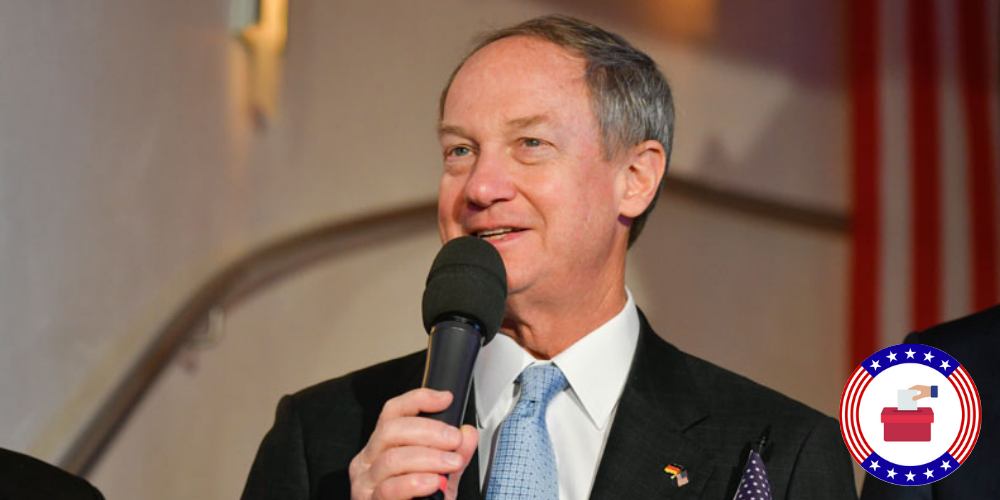„Trump wants to impose a minimum 10% tariff and risks a trade war“

The future transatlantic cooperation depends on who wins the US Presidential election, writes John Emerson, US Ambassador to Germany (ret), 2013-17, and Chair, American Council on Germany.
By John Emerson
What will the future transatlantic cooperation look like? What is the likely attitude toward Germany and Europe of the next President?
The answer to this question will be starkly different depending on who wins the US Presidential election. There are certainly some similarities between the two. Both President Harris and President Trump would continue to press Europe to spend more on its collective defense, and to play a greater leadership role in confronting the challenges we face globally. And both will work to encourage increased foreign direct investment in the United States, and caution Europe not to increase its dependence on China for economic growth. But the similarity largely ends there.
Kamala Harris, who has participated in three successive Munich Security Conferences, is firmly committed to America’s values-bases alliances around the globe. In particular, she will continue the bipartisan commitment to NATO and its determination to stand up to Russian aggression. She will also continue to provide the leadership within NATO we have seen from Presidents such as Joe Biden and George HW Bush. She has met with Chancellor Scholz on numerous occasions, and with Chancellor Merkel before him, and recognizes the importance of our alliance. Her national security advisor, Phil Gordon, served as Assistant Secretary of State for Europe and Eurasia during President Obama’s first term, and is also very familiar with Europe, and Germany in particular. A President Harris and her national security team would undoubtedly seek to strengthen and deepen the transatlantic relationship during her term in office.
Donald Trump, on the other hand, has said he will end the war in Ukraine in “one day.” While that is clearly hyperbolic, as VP Harris has said, he is essentially advocating “surrender.” During the presidential debate between Trump and Harris, Trump refused to answer the moderator’s question of whether he “wanted Ukraine to win.” He has made no secret of his deep admiration for, even obsession with, Vladimir Putin. According to several of his first term national security team members, he regularly mused about withdrawing from NATO.
While I don’t see that happening formally, especially given the strong bipartisan support for the alliance that exists within Congress, a President can certainly de facto reduce the US engagement in and leadership of NATO. And interestingly, two of his former national security advisors, one chief of staff, two of his defense secretaries, one of his secretaries of State, the chairman of the joint chiefs of staff, and his own vice president (all of whom he appointed) have been very clear that Trump does not have the temperament or judgment required of a President, and have refused to endorse him in this race. One even recently called him a “fascist” in his beliefs and in how he would seek to govern.
A Trump win would be rocket fuel for the growing right wing populist movements in Europe
Moreover, a Trump win would undoubtedly be rocket fuel for the growing right wing populist movements throughout Europe. To that end, one of Trump’s closest advisors in the area of national security and transatlantic relations is his former Ambassador to Germany, Ric Grenell, who openly stated in a Breitbart article shortly after assuming his post that one of his goals was to strengthen such movements within Europe.
From an economic standpoint, Donald Trump has made clear his intention to impose a minimum 10% tariff on all goods imported into the United States. This risks a trade war, even with our allies, and is something Germany and Europe will need to deal with immediately. While Kamala Harris will energetically work to bring manufacturing jobs back to the United States, her economic plan pursues a different course.
I often tell my European friends that to understand the transatlantic relationship under a Trump 2.0 Administration, they should recall the photograph from a G-20 of Donald Trump seated at a table, arms folded, glaring at Angela Merkel, standing and leaning forward across the table, with Merkel surrounded by several of their fellow heads of government. That image best encapsulates where we will be headed.
It is important to note, however, that regardless of how the election turns out, and beyond the personalities of our respective heads of government, the American Council on Germany will continue its work to strengthen the people to people, business to business, civil society, and government to government ties between Germany and the United States. That work will never end.
